What exactly is an Exotic Shorthair cat?
Exotic Shorthair cats, also known as Exotics, are a breed of domestic cat derived from crossbreeding American Shorthair cats and Persian cats. They are sometimes call the “lazy man’s Persian” since they have all of the endearing qualities of Persian cats but come without the maintenance requirements that long-haired cat breeds have.
This article will explore the Exotic Shorthair’s physical characteristics, personality traits, and care requirements. We’ll also discuss some of their common health issues and offer tips on how to keep your Exotic happy and healthy.
Read on to learn more about this wonderful breed!
Exotic Shorthair Cat Origins
The Exotic Shorthair cat’s origins are rooted in breeding programs for American Shorthair cats dating back to the 1950s. At that time, some American Shorthair breeders began crossing their cats with Persian cats to improve their body type. Crosses with Russian Blue and Burmese cats were also used.
However, American Shorthair breeders in general did not approve of these crosses, and breed standards were updated to exclude any cats that showed signs of crossbreeding. But, the story didn’t end there.
At least one dedicated breeder, seeing the potential of these crosses, kept working on the breeding program and promoting them as a distinct breed. The Exotic Shorthair was recognized by the Cat Fanciers Association (CFA) in 1966, and accepted for championship status in 1967.
The Exotic Shorthair cat breed quickly grew in popularity, and is now one of the most popular breeds in the United States.
Exotic Shorthair Cat Characteristics
Exotic Shorthair Cat Intelligence
The Exotic Shorthair cat is generally considered an intelligent breed. They are very interactive, playful cats that enjoy a variety of activities and challenges. They can learn tricks and understand commands quickly.
Like their American Shorthair ancestors, they also have strong hunting instincts; many owners report their Exotics chasing or stalking anything that moves, from kids to birds. This can be an entertaining trait for the family but owners should provide plenty of toys and activities to keep them entertained.
Are Exotic Shorthair Cats Affectionate
Exotic Shorthair cats can be very affectionate. They often enjoy snuggles and cuddles with their owners, as well as love to be petted and groomed.
This breed also tends to bond closely with their humans, forming strong attachments. Like their Persian relatives, they are usually quite happy to be lap cats.
Are Exotic Shorthair Cats Friendly With Other Animals
Exotic Shorthair cats can generally get along with other animals if introduced to them properly. They may be shy around unfamiliar animals, but they can learn to accept them with patience and proper socialization
However, they can be aloof to strangers and strange animals, so don’t expect them warmly greet your visitors or their pets.
Exotic Shorthair Cat Personality
Exotic Shorthairs tend to be gentle and quiet cats, unfazed by the hustle and bustle of family life. They are content to enjoy their comforts in a calm setting but can be quite active when they have the opportunity.
These cats are generally laid-back and adaptable. Overall, Exotic Shorthairs are a great breed for people looking for a loving companion that’s easygoing, affectionate, and intelligent.
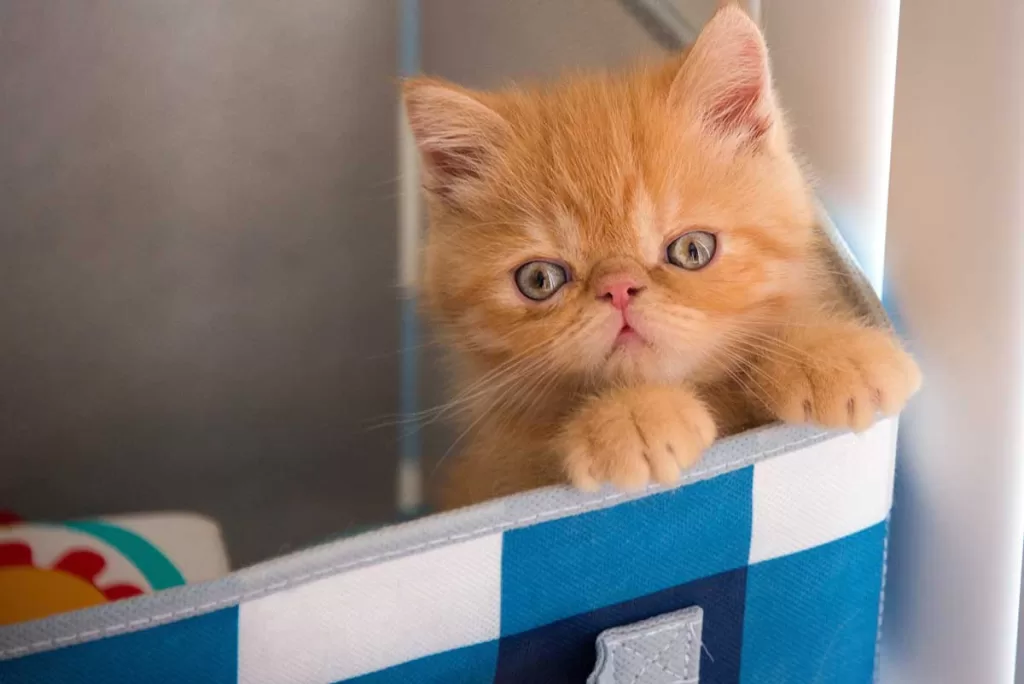
Are Exotic Shorthair Cats Good With Children
Exotic Shorthairs are usually good with children and can become very attached to their families. They will usually tolerate being handled and picked up, as long as it’s done gently. However, all cats should be supervised around young children.
Some Exotics may not appreciate being poked or played with too roughly, so it’s important to teach your children how to interact with a cat responsibly. It’s also advisable to keep these cats away from any noisy or chaotic environments that could be too stressful for them.
Exotic Shorthair Cat Vocalization
Exotic Shorthairs are not known to be overly vocal cats. They may meow a few times when they’re hungry or want attention, and may also purr and chirp to show happiness and contentment. But in general, these cats typically prefer to remain relatively quiet.
Exotic Shorthair Cat Energy Level and Exercise Needs
Exotic Shorthairs are moderate-energy cats that have a reputation for being calm and docile. But they also enjoy regular exercise, playtime, and interactive toys. They may not be as active as some other breeds but should still have plenty of opportunities to jump, climb, explore and chase.
These cats do tend to get lazy as they get older, which can lead to obesity and other problems. To help keep them fit and trim, owners should provide plenty of exercise and activities for their Exotic Shorthair cat.
Are Exotic Shorthair Cats Easy to Train
Exotic Shorthairs are very intelligent cats and can be trained relatively quickly. They tend to respond well to positive reinforcement methods such as treats or verbal praise. They can learn commands and tricks fairly easily.
Exotic Shorthair Cat Appearance
How Big Do Exotic Shorthair Cats Get
Exotic Shorthairs are considered medium-sized cats and typically weigh between 6 and 12 pounds. They have stout legs and do not get very tall – typically between 10-12 inches when mature.
Exotic Shorthair Cat Coat Type
The Exotic Shorthair cat breed is known for its unique coat, which is what sets them aside from their Persian ancestors.
Their thick and fluffy fur is just a little longer than other shorthaired breeds. Underneath the luxurious topcoat is an undercoat comprised of shorter, softer hairs that give them their signature fluffiness without sacrificing ease of care.
Their coats are incredibly soft, often likened to mink or rabbit fur in terms of silky smoothness.
Because of their Persian background, some Exotic Shorthairs still carry the gene for long hair. It is recessive, meaning that both parents must have a copy in order to able to produce a longhair kitten. When both parents are carrying a copy of the gene, one out of four kittens will have long hair.
Exotic Shorthair Cat Whiskers
Exotic Shorthairs have just the right amount of whiskers. They are not overly long, but they are noticeable and give the cats an elegant look.
Exotic Shorthair Cat Coat Color And Patterns
The original name intended for the new breed was “Sterling,” derived from the beautiful silver color of some of the original breed lines. Although the initial breed standard was planned solely for the silver color, all Persian colors were admitted into the new Exotic Shorthair breed right from the start.
Today, Exotic Shorthairs display all the different coat colors of the Persian breed – from solid black or white to calico and tabby patterns. Blue, red, lilac, pointed and smoke colors and patterns are also seen.
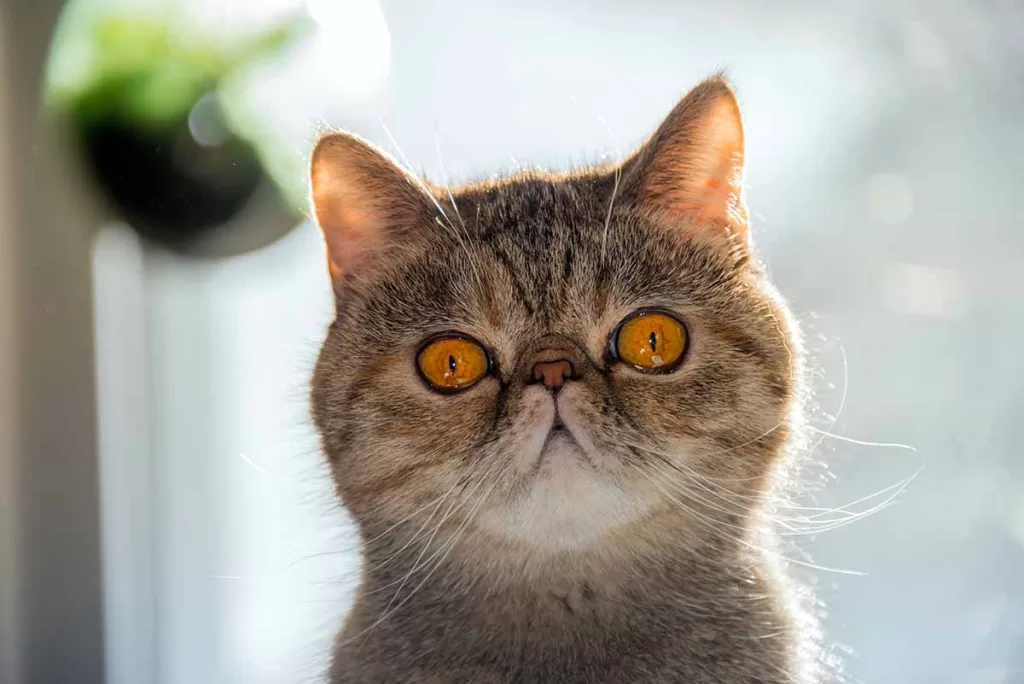
Exotic Shorthair Cat Eye Color
Exotic Shorthairs typically have round eyes with a vivid, striking color. The most common eye colors for Exotics are copper, blue, and green depending on the cat’s coat color.
Some Exotics may also have odd or heterochromatic eyes – one blue eye and one copper eye. This can give the cats a particularly striking and unique look.
Exotic Shorthair Cat Body Type
Exotic Shorthair cats have a distinctive look that starts with their head. They have a flat face that tapers to a broad, snub nose and wide muzzle. Their eyes are large and round, adding to their irresistibly cute expression.
The eyes are easily noticeable when viewed from the side, and the forehead, nose, and chin appear to be aligned vertically.
The Exotic Shorthair cat has small ears that are round-tipped, tilt forward, and are not overly open at the base. The ear placement is low on the head and set far apart in such a way that it conforms comfortably to the rounded contour of the head.
This breed is known for its cobby and stocky body type. They have broad chests and heads with short, straight legs that make them look a bit like teddy bears.
The length of the tail is short, but it is proportionate to the body length. It is carried straight and at an angle lower than the back.
Exotic Shorthair Cat Lifespan
Exotic Shorthair cats typically live 12-15 years when cared for properly. They are prone to several breed-related health issues which can shorten lifespans if not caught and treated early.
Good nutrition, regular veterinary visits, and plenty of exercise will help to ensure your Exotic Shorthair cat has a long and happy life.
Exotic Shorthair Cat Health Issues
Exotic Shorthairs are known to experience several health issues common among purebred cats and brachycephalic breeds.
Brachycephalic airway obstructive syndrome (BOAS)
BOAS is caused by the shape of their head. Due to the small and flat facial structure, Exotic Shorthairs can experience difficulty breathing, snoring, and even open-mouth breathing due to obstruction in the nose or throat.
This obstructed breathing can lead to a range of health issues. Chronic irritation of the airways makes these cats more prone to respiratory infections. They experience issues such as frequent fatigue, coughing, illness, and possible collapse.
The constant strain of trying to get enough breath puts pressure on the heart, and these cats can go on to develop heart failure. Shortness of breath means they tire easily and will have decreased activity, which can lead to obesity.
Obesity
Given that this breed is less active in general and they are prone to respiratory issues, Exotic Shorthairs tend to be less active overall which leads to problems with obesity.
Obesity can be caused by a poor diet, lack of exercise, or underlying health issues that make it difficult for them to stay active. It is a vicious cycle since obesity makes the underlying problems worse as well as causes additional health problems.
It is important that Exotic Shorthair cat owners pay close attention to their cat’s diet, weight, and activity level, as well as regular check-ups with the vet.
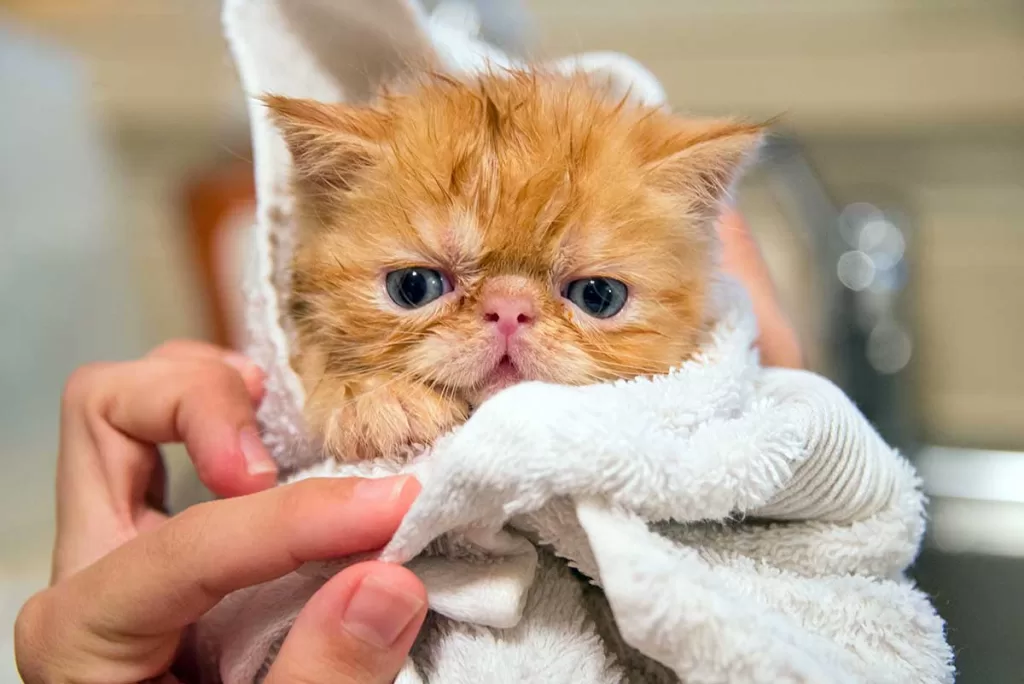
Dental Disease
Dental disease is another common issue in cats, and the Exotic Shorthair is no exception. The short face of this breed can cause misalignment of their teeth which can lead to tartar buildup, periodontal disease, and painful infections.
At-home dental care is essential for these cats along with professional cleanings from your vet. Regular brushing with cat-safe toothpaste can help to keep their teeth and gums healthy, reducing the risk of periodontal disease.
Polycystic kidney disease (PKD)
PKD is a genetic disorder that leads to the gradual growth of cysts filled with fluid in the kidneys. The development and expansion of cysts in the kidneys happens gradually, resulting in the decay of kidney tissue and a steady decline in kidney performance.
PDK is a known problem in a number of cat breeds, including the Exotic Shorthair’s relatives the American Shorthair and Persian breeds. This genetic disease can affect almost 50% of susceptible breed lines.
PKD ultimately leads to complete kidney failure. Good breeders ensure that their cats are tested for genetic markers of this illness, and they exclude carrier animals from their breeding program.
Hypertrophic Cardiomyopathy
The Exotic Shorthair is also predisposed to another genetic disorder known as hypertrophic cardiomyopathy. In this condition, the walls of the left ventricle become thickened and less flexible resulting in a decrease in cardiac output. This leads to poor circulation, difficulty breathing, and can even lead to sudden death.
Unlike PKD, there is no test to detect carrier animals. It is important for Exotic Shorthair owners to be aware of this disorder and get their cats tested often for signs of it. Treatment can help to manage the symptoms and extend your cat’s life expectancy.
Progressive Retinal Atrophy (PRA)
PRA, a known genetic disease of Persian cats, also affects the Exotic Shorthair breed. This condition causes the gradual degradation of their eyesight and leads to complete blindness if left untreated.
PRA in cats can occur due to a few different mechanisms. The causative gene in the Abyssinian breed had been isolated, and genetic testing can identify this gene in that breed. However, the causative gene for PRA in Persian cats (and by relation, in Exotics) has not been identified and there is not yet a genetic test for PRA carriers in Exotic Shorthair cats.
Eye Problems
Exotic Shorthairs are also predisposed to chronic eye problems. Their large, round eyes can be prone to entropion (inward rolling of the eyelids) and ectropion (outward rolling of the eyelids), both of which can cause chronic irritation and infections in the eye.
Due to their brachycephalic face, tear ducts often do not drain properly, resulting in tear staining and making them prone to eye infections. They are also prone to getting corneal ulcers and cherry eye.
Exotic Shorthair Cat Care
Exotic Shorthair Cat Grooming
The hair coat of the Exotic Shorthair cat is double layered – a silky soft top coat with a soft, thick woolly layer underneath.
Exotic Shorthair cats generally have manageable coats. Typically, a weekly brushing to remove dirt and loose hair is all that needs to be done to keep their coat in good condition.
However, since they do have a double coat, they have twice the amount of hair to shed! Or at least it seems that way when they start shedding.
You will need to increase the frequency of grooming, perhaps even daily, to keep up with the amount of hair that will come off of your cat during its seasonal shed.
While regular bathing is not strictly necessary, Exotic Shorthair cats may need occasional baths for removing dirt or if they get into something sticky or smelly. Be sure to use a pet-friendly shampoo formulated for cats to avoid any skin reactions.
Exotic Shorthair owners should also watch their cat’s eyes and clean them daily with a warm, damp cloth or tissue. This will help to remove any dirt or debris that may get lodged in the animal’s eyes and help prevent eye infections from developing.
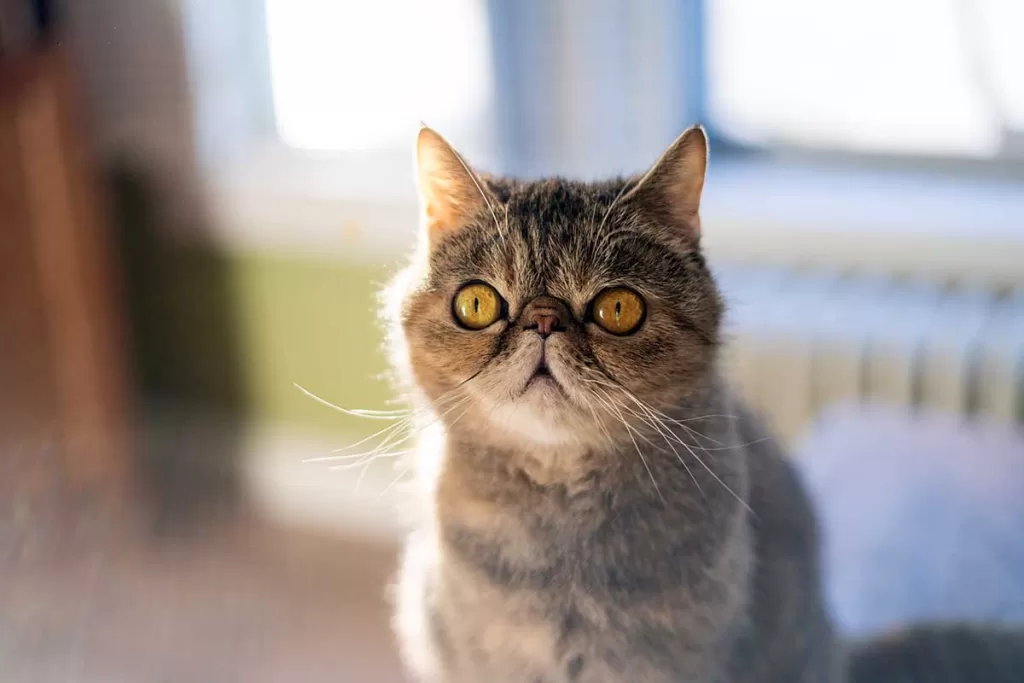
Exotic Shorthair Cat Diet And Nutrition
Exotic Shorthair cats should be fed high-quality, nutritionally balanced cat food that is appropriate for their life stage and activity level. Make sure to select a high-quality food that is formulated for their particular needs.
As Exotic Shorthair cats age, their activity level typically decreases. It is important to keep an eye on their weight and how much food they eat. You can help prevent obesity by making sure to give them lots of opportunities to play and exercise and feeding a weight control diet.
Some cats may need a special diet because of a health condition. For example, cats that develop kidney disease need a special diet that has reduced protein, sodium, and phosphorus, as well as increased omega-3 fatty acids. This specialty food are available from your veterinarian.
Are Exotic Shorthair Cats Hypoallergenic
Exotic shorthair cats are not hypoallergenic. If you have allergies or asthma, it’s best to avoid owning a cat because all cats produce allergens that can cause reactions. Alternatively, if you choose to own a cat, be prepared to take a lot of allergy medicine.
Where To Buy Exotic Shorthair Cats
Here at Cat BYTES we always advocate for adopting from a shelter or rescue whenever possible.
However, if you are looking for a purebred Exotic Shorthair then the chances of finding one at your local animal shelter are pretty slim.
You can try searching online for a rescue group in your area. Some rescue groups operate nationally, such as Adopt A Pet.
However, your best bet at finding an Exotic Shorthair cat is through a reputable breeder. This is also best for finding a healthy animal since trusted breeders will test their animals for health problems and offer a written guarantee that your kitten is clear of prevalent genetic diseases.
Start by searching for a breeder in your area. Finding one close to you allows you to view the kitten or cat in person before making a purchase. If you can’t find one in your area, many breeders are experienced in shipping live animals to their customers.
Exotic Shorthair Cat Price
The cost of an Exotic Shorthair cat can differ significantly based on the breeder you choose. Keep in mind that they may be quite pricey. On average, the cost of a purebred Exotic Shorthair cat ranges from $1,200 to $2,200. Cats meant for breeding and showing will cost you even more.
Conclusion – The Nitty Gritty About This Kitty
Exotic Shorthair cats are beautiful, loving animals that can make wonderful companions. If you’re looking for a cat to cuddle with and adore, then this breed may be perfect for you.
But before making the commitment, it is important to determine if owning an Exotic Shorthair cat is right for your lifestyle. You also need to consider the investment required – the cost of purchasing a purebred Exotic Shorthair cat can be quite expensive, and lifetime costs for veterinary care are typically higher than that of the average housecat.
But overall, if you’re looking for a feline that loves attention and cuddles, then the Exotic Shorthair cat is definitely a breed to consider. With proper care and lots of love, they can make a wonderful addition to your family.
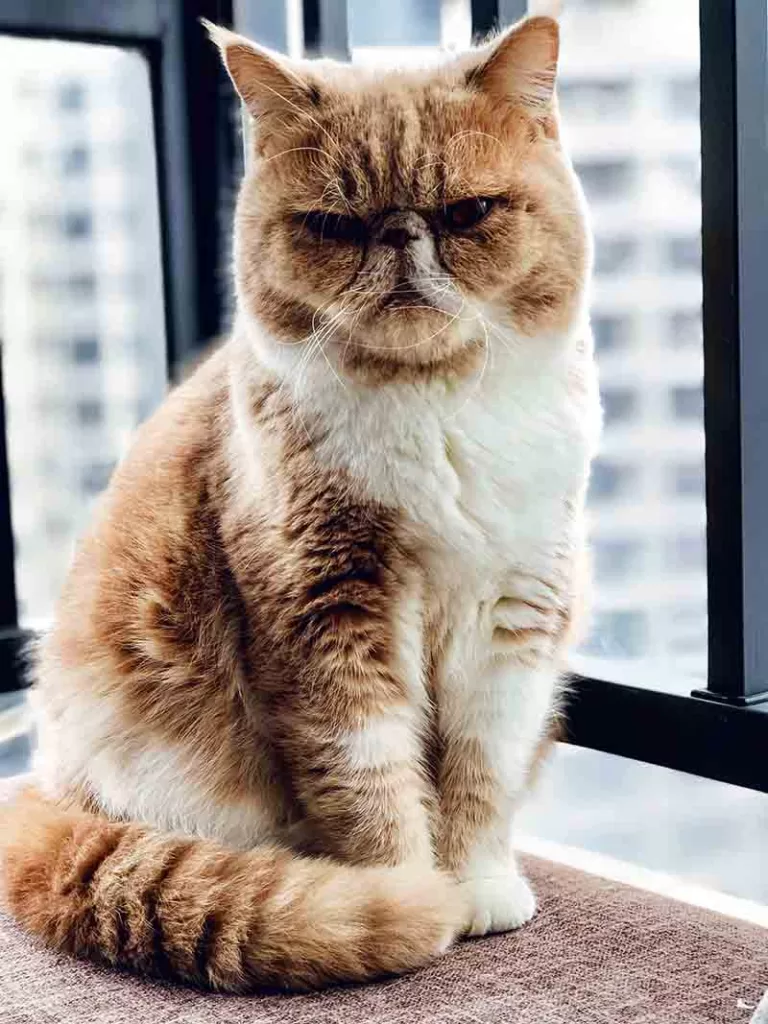

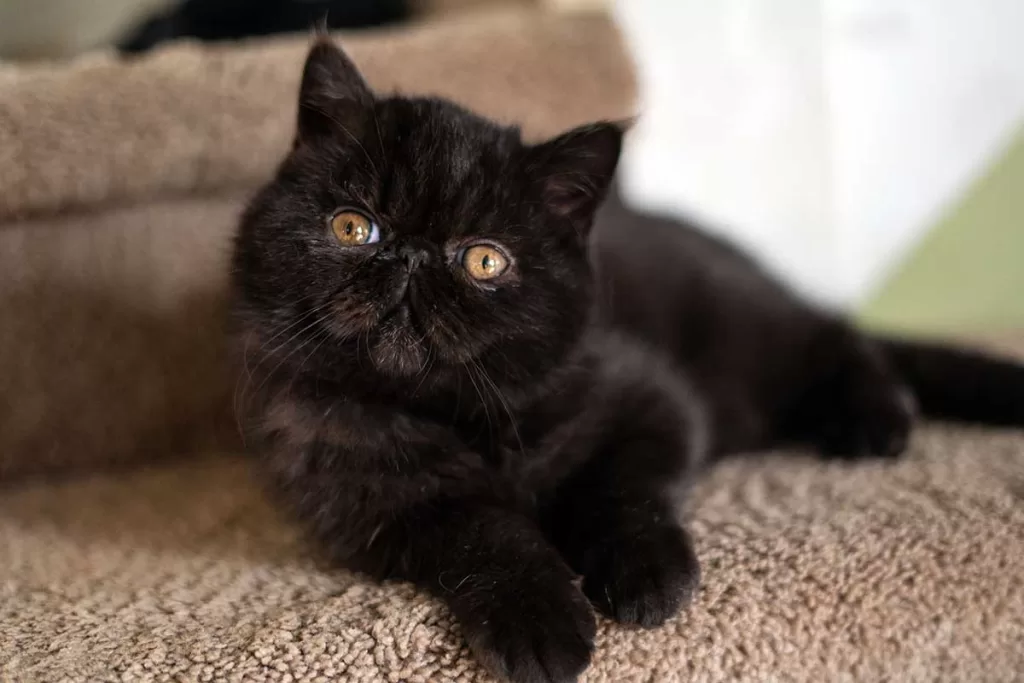

I. Just bought One. Exotic shortair We adore him.
Its a tabby identical to thé photo above